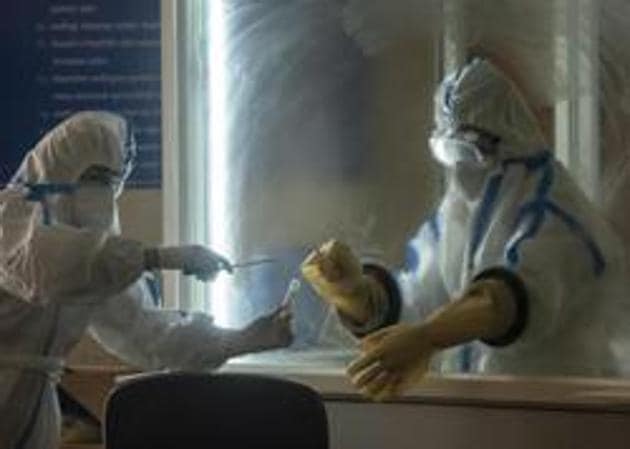The twin tales of vanishing antibodies, robust T-cells | Opinion
Studies have explained immunity to Covid-19, but there’s no clarity on the grades of immune responses of people
As we enter the peak of the Covid-19 pandemic with over 15 million infections and more than 620,000 fatalities globally, it is becoming clear that the risk of infection is not uniformly distributed across populations. Everyone wants to know if the development of antibodies in asymptomatic and those recovered prove that they are protected from the virus. Can such people get reinfected, and if they do, will it be mild or a more severe disease?

Last week, three studies enhanced the understanding of the involvement of host immunity to coronaviruses in general, and the Sars-CoV-2 virus in particular. A study from the King’s College London of longitudinal evaluation of antibodies in 90 virus-positive health care workers showed that 60% of the participants developed “potent” antibody response that peaked three weeks after they developed symptoms. This fell to 17% three months later. In fact, some individuals no longer had any trace of antibodies. The study showed that the level of antibodies was depleted by as much as 23-fold in 90 days after infection. This observation highlights the point that the best time to obtain convalescent plasma for therapy is between four to six weeks after the appearance of symptoms.
Similar observations of loss of antibody immunity were recorded in a Spanish study, involving 70,000 people. At least 14% of those tested positive later turned negative; the loss of immunity being most common among those who never developed symptoms. These observations raise questions on the ability to tackle the virus in the short-to-medium term.
The vanishing antibodies are a reminder that their presence in Covid-19 does not mean guaranteed protection. These findings align with observations from Germany and China and dampen hopes of long-term immunity in those recovering from the infection. They also have implications for the development of a vaccine and the question about reinfection.
Do depleting antibodies signify that the person doesn’t have immunity anymore? What about the cell-mediated immunity, involving killer T-cells, often referred to as the immune warriors? These cells are a part of the human immune response against viral infections due to their ability to kill infected cells. Until now, we had a limited understanding of the involvement of T-cells in immunity against Sars-CoV-2, but it is possible that these cells play a pivotal role in protection. The question is whether we can use T-cell responses as indicators of immunity?
An interesting feature of immunity to Sars-CoV-2 virus is that a reasonably good number of non-exposed individuals may already have immunity from previous exposure to coronaviruses, of which at least six are known to infect humans. Of these four are endemically transmitted and cause the common cold, while the other two, Sars-CoV-1 and MERS-CoV have caused limited epidemics of pneumonia in 2003 and 2017, respectively.
An online paper from the Duke-NUS Medical School in Singapore published in Nature on July 15 makes two important points: One, in addition to neutralising antibodies, all of the recovered Covid-19 patients were found to have Sars-CoV-2-specific T-cells, which suggests that these play an important role in this infection. Second, patients recovered 17 years after the 2003 outbreak still possessed long-lasting memory T-cells that displayed cross-immunity to Sars-CoV-2. The discovery is promising because other studies have also suggested that even though antibodies may fade within months, the all protective army of T-cells can stay in circulation for years.
It is important to note that the 2003 Sars-CoV-1 infection also originated through animal-to-human transmission in the Guangdong province of southern China. It reached its peak in late May 2003, affecting other areas such as Toronto, Hong Kong, Taipei, Singapore and Hanoi and killed about one in 10 infected people. In all, there were just over 8,000 cases and about 700 deaths. It disappeared in a matter of months and by July 2003, the World Health Organization declared the threat over. Interestingly Sars-C0V-1 and Sars-C0V-2 are closely related, with about 80% of their genome being identical. It is possible that much of the population in China and other Sars-CoV-1 affected areas still enjoy long- lasting immunity and have largely been spared of the current pandemic.
The Singapore study highlights that the endemic coronaviruses trigger both T-cell and IgG antibody activity. More good news comes from Oxford where the phase I human trials of their Covid-19 vaccine have shown that it generates an immune response that may offer a “double defence” against the virus. It stimulated the body to produce both antibodies and “killer T-cells”.
Resistance to infection may accrue from previous exposure not only to seasonal endemic coronaviruses, but also other microbes, all of whom trigger both T-cell and antibody activity. For instance, the Indian population has been exposed to a vast variety of pathogens, leading to the generation of broad specific memory T-cells, ready to confer protection from new invaders. It will be interesting to screen the exposed, uninfected subjects to examine the presence of both neutralising antibodies and killer-T cells that can protect against Covid-19 infection.
A third very interesting study, again from the University of Oxford on July 16, suggests that a large degree of regional variation, observed in seroprevalence and cumulative deaths, is attributable to innate host resistance leading to significant reduction in expected mortality.
It is encouraging that in a matter of only a few months, literally thousands of studies have appeared in peer-reviewed high- impact journals explaining immunity to Covid-19; it is still not clear whether the asymptomatic and symptomatic people have different or similar grades of immune responses.






